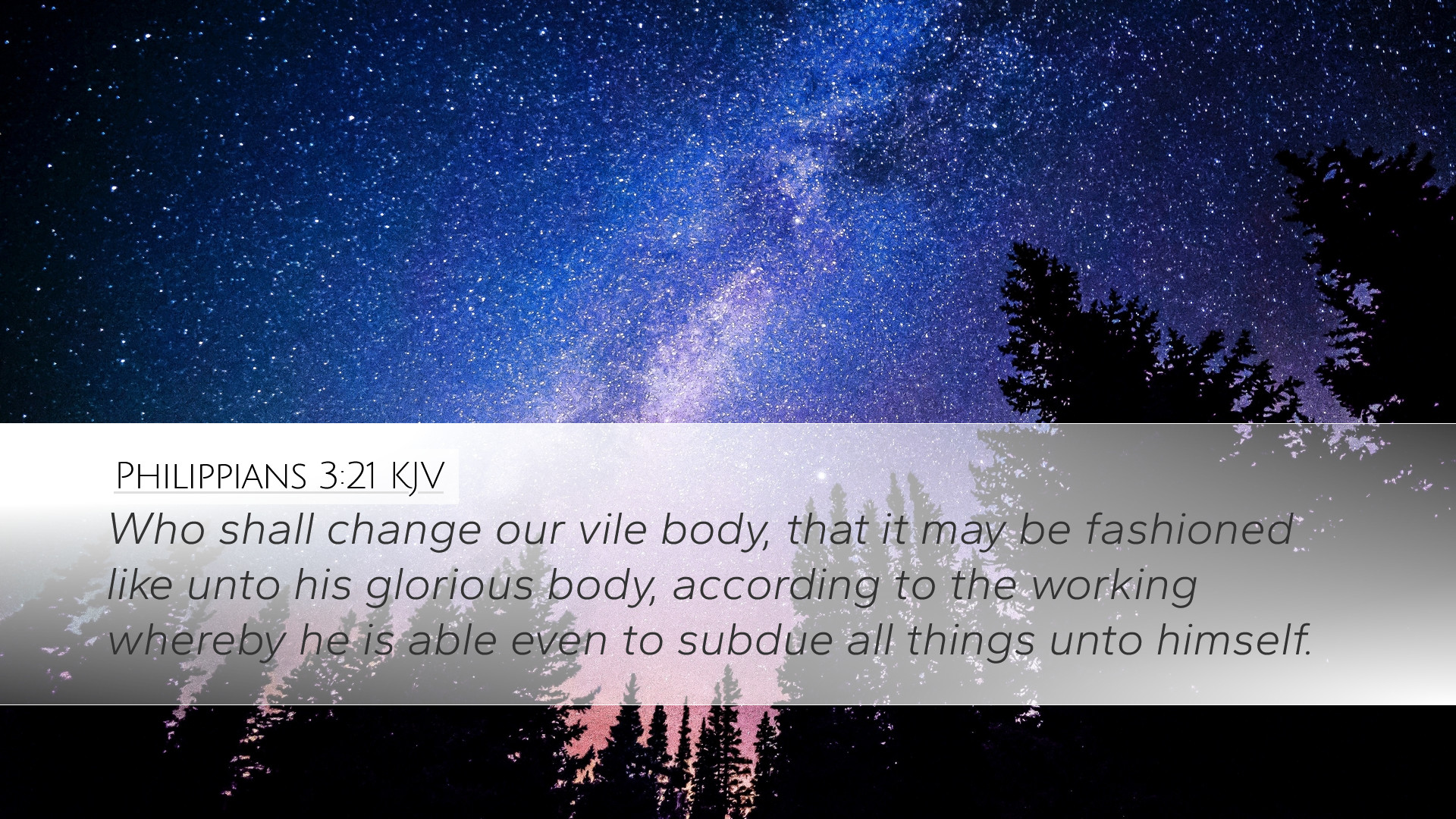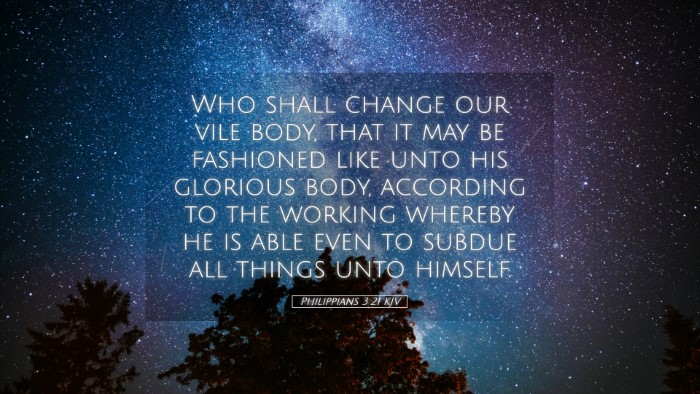Commentary on Philippians 3:21
Philippians 3:21 (KJV): "Who shall change our vile body, that it may be fashioned like unto his glorious body, according to the working whereby he is able even to subdue all things unto himself."
Introduction
This verse from Philippians encapsulates the profound hope and transformative promise of the Christian faith concerning the resurrection and glorification of believers. The Apostle Paul, writing to the Philippian church, underscores both the current state of believers and the glorious future awaiting them. In this commentary, we delve into insights from public domain sources, drawing from the works of Matthew Henry, Albert Barnes, and Adam Clarke.
Contextual Background
The Apostle Paul’s letter to the Philippians is rich in theological reflections and practical exhortations. In chapter 3, he contrasts the life of the flesh with the life of the Spirit, urging believers to press toward the heavenly goal. This latter part of the chapter emphasizes the hope of transformation at the second coming of Christ, thus preparing the Philippians for the trials and temptations they faced.
The Nature of the "Vile Body"
Matthew Henry elaborates on the term "vile body," suggesting that it reflects the humble and lowly condition of our earthly existence. In contrast to God's design for humanity, our physical bodies are frail, prone to decay, and marked by sin. Paul highlights the need for a transformation that transcends this current state.
Albert Barnes reiterates that the "vile" aspect pertains not only to physical frailty but also to the moral degradation associated with it. The Christian’s current body is, in some sense, a body of humiliation—subject to sin, sickness, and ultimately death. Such a state underscores the believers' longing for liberation and restoration.
Transformation and Glorification
The hope encapsulated in Philippians 3:21 is foundational to Christian eschatology. The term "change" signifies a radical transformation. Adam Clarke notes that this change will be complete and perfect, aligning the believer's body with the glorious body of Christ. Clarke emphasizes the beauty of the resurrection where believers will be transformed into a state devoid of suffering, sin, and death.
- This transformation is:
- Complete: The change will be total, affecting every aspect of our being.
- Glorious: Reflecting the majesty and holiness of Christ's resurrected body.
- Instantaneous: Occurring in a moment at the second coming of Christ.
The Power of Christ
The latter part of the verse underscores the sovereignty of Christ, "according to the working whereby he is able even to subdue all things unto himself." Matthew Henry emphasizes the omnipotence of Christ, who not only promises transformation but possesses the authority to execute it. This divine power assures believers that their hope is not in vain but firmly rooted in the capabilities of Christ.
Albert Barnes comments on the comprehensive nature of Christ's authority: He can subdue all things—both physical and spiritual. This includes both the elements of the world that oppose God’s plan and the sinful nature within humanity. The promise of bodily transformation comes with the assurance of Christ’s ultimate reign and control.
Theological Implications
This verse is deeply theological, presenting essential truths regarding body, sin, redemption, and hope. Adam Clarke draws attention to the juxtaposition of our current state against the promised glory. The verse becomes a key text for understanding Christian hope in resurrection, which is not merely spiritual but encompasses the physical body as well. The affirmation of bodily transformation stands in opposition to heretical views that devalue the physical aspect of salvation.
Conclusion
In conclusion, Philippians 3:21 serves as a powerful reminder of the transformative hope inherent in the Christian faith. Believers are assured that their current suffering and bodily limitations will one day be eradicated. Through the insights of Matthew Henry, Albert Barnes, and Adam Clarke, this verse encourages us to look forward to the glorious resurrection and the complete restoration that awaits all who are in Christ. This hope not only uplifts our spirits but also compels us to live life with a sense of purpose, encouraging others in their journey of faith.
Reflection Questions
- How does the promise of transformation influence your daily living as a believer?
- In what ways can understanding the power of Christ give you confidence in times of struggle?
- How can we as a community of faith encourage each other to look forward to our glorification?


